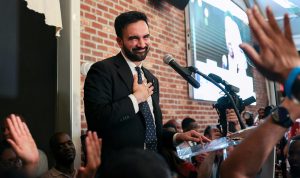For this week’s Fault Lines column, Jon Allsop is filling in for Jay Caspian Kang.
Since Donald Trump returned to office, in January, a number of controversies have appeared to expose tensions within hisMAGAmovement, or to alienate key members of it: visas for skilled workers (actually, that dispute flaredbeforeTrump returned to office); the decision tobomb Yemen; the fact that officials in his Administration added the editor ofThe Atlanticto a group chatabout bombing Yemen, then tried to dodge the blame;tariffs; spending; thedeportation of a gaymakeup artistto a Salvadoran mega-prison; Trump’s acceptance of a luxury jet as a gift from Qatar; the conspiracy theory that Jeffrey Epstein wasn’t actually murdered; the conspiracy theory that files relating to Epstein’s crimes haven’t been released because Trump appears in them.
Recently, media talk of a “MAGAcivil war” reached its apex over the question of whether the U.S. should bomb Iran’s nuclear infrastructure. The former Fox host Tucker Carlson, who opposed such an operation, sparred with two boosters: the current Fox host Mark Levin, and the Republican senator Ted Cruz, whom Carlson revealed to be ignorant of basic facts about Iran in aclipthat went viral. Last week, as Israel attacked the Islamic Republic and Trump increasingly seemed keen to join in,MAGApersonalities like Charlie Kirkexpressed fearthat doing so could profoundly fracture Trump’s movement; Kirk polled his X followers on whether the U.S. should get involved, and, of the nearly five hundred thousand respondents, ninety per cent said “No.” Candace Owens, a far-right commentator, accused Trump of betraying his promise not to enter foreign wars. In response, Laura Loomer, another far-right commentator, who earlier this yearpersuaded Trumpto fire various national-security officials,saidthat she was “screenshotting everyone’s posts” and “going to deliver them in a package to President Trump so he sees who is truly with him and who isn’t.” She added, “I am the loyalty enforcer.”
Some observers found the “civil war” narrative to be overhyped, however. Vice-President J. D. Vance—in the past, a vocal critic of U.S. interventionism—laid down a template for any Trump adherents looking to thread the needle, writing on X that, although “people are right to be worried about foreign entanglement after the last 25 years of idiotic foreign policy,” Trump had “earned some trust” to act responsibly. Later, Vance would say, on “Meet the Press,” that the difference between this campaign and wars past is that, “back then, we had dumb Presidents.” Trump had bombed Iran the night before Vance’s appearance on the show, and by this pointheadlinesweresuggestingthatMAGAhad mostly fallen in line. “Opinions are like assholes,” Loomerwrote, taking a victory lap. “Everyone has one. Some are cleaner than others, but if you get too close to the hole, you’re going to end up with shit all over your face.” KirkcreditedTrump with a “historic masterclass.” After Iran indicated that it wouldn’t escalate, Carlsonposted“Thank God,” then went back todunking on Levin.
There are several reasons, it seems to me, whyMAGAdidn’t ultimately tear itself in two over the Iran strikes. The way the story unfolded offered something for everyone: the hawks within the movement got to claim that Trump acted decisively to eliminate the Iranian nuclear threat, while the doves, if that’s the right word, got to claim that Trump showed restraint and, after Israel and Iran (eventually) committed to a ceasefire, made peace. (This dynamic is familiar—be it a reflection of political savvy or incoherence—as I explored ina recent columnabout how Trump has managed simultaneously to throw meat to traditional “small-government” Republicans and to those who see a more expansive role for the state.) Above all, perhaps,MAGAdiehards understand that Trump is both the charismatic glue holding an otherwise disparate movement together and its wrathful enforcer—what he says goes. (While the Iran story was unfolding, he wagedsocial-media waron Thomas Massie, a Republican congressman who has opposed both the strikes and Trump’s spending plans.) Two weeks ago,The AtlanticaskedTrump about critics who said that backing Israel’s war with Iran was inconsistent with his “America First” agenda, and he responded that the term “wasn’t used until I came along,” so he gets to define it. As is so often the case with Trump, this statement was both literally false—the term dates back at least as far as the eighteen-eighties—and effectively true.
The controversies that I listed at the top of this column didn’t decisively splitMAGAeither, for a couple of reasons. First, taken together, they haven’t spawned consistent factions: Loomer and Levin, for example, strongly criticized Qatari-jetgate, but enthusiastically backed Trump’s decision to bomb Iran. Second, the extent of the controversies has often been exaggerated: a handful of Trump supporters have stuck their heads above the parapet, the media have sniffed drama and written up stories about friction, and nothing has ultimately changed. It’s not really surprising that the broad ideological coalition put together by Trump last year would have internal disagreements, or that the movement’s macho energy would occasionally lead to a butting of heads. (Exhibit A: Elon Musk, who has fought with Steve Bannon, the Trump consigliere turned podcaster; Treasury Secretary Scott Bessent; and, of course,Trump himself.)MAGAhas remained remarkably unified for a long time, through all sorts of enormous political stress tests.
Happily ever after, then? I’m not so sure. If the narrative of civil war among prominentMAGAinfluencers is often overblown, these voices do not reflect the full diversity of people who cast their lot with Trump last year, many of whom were never as fully locked in to theMAGAproject as Trump’s imperious post-election behavior has suggested. AsThe Bulwark’sWill Sommer recentlynoted, “The political threat that Trump may face over attacking Iran won’t come from within the traditional MAGA movement but from the newer people he’s brought into it.” This includes “comedians and tough guys”—such as the podcaster Joe Rogan and the comic Theo Von—who “tend to be anti-war” and “depend on their audiences feeling that they’re authentic, which in part means they’re not tied to any political party.” Von, Rogan, and others like them have often been described as apolitical, and this assessment, true or not, added great weight to their endorsements of Trump. IfMAGAinfluencers disagree on stuff sometimes, theyallcare a lot about politics. The schism that they may actually need to worry about, I think, is between the obsessives and the casuals.
It’s too soon to say how the Iran strikes played with the latter group. But we already have some clues, and they aren’t uniformly positive for Trump. Last year, the standout moment of his tour of so-called“manosphere” podcasts, widely cast as crucial in his greatly improved performance among young male voters, came when he sat down with Von for a conversation that delved at length into the subject of addiction—Von’s, but also Trump’s brother’s—and showcased Trump as both a sympathetic and empathetic human being, rare public modes for him. The interview also allowed Trump to bathe in the essential conceit that he is not part of the establishment. (“It’s pretty clear that the establishment doesn’t like you,” Vonsaid, in one exceedingly on-the-nose exchange; Trump replied, “I think thepeoplelike me.”) Last week, Von, who was interviewing the Democratic congressman Ro Khanna, said that no one he knows supports the Iran strikes. “I don’t want people I know, my friends, getting called up; I don’t want the children of my friends getting called over to die,” he said. “I don’t even understand how it’s an option.”
Other manosphere or manosphere-adjacent figures were even moreharshlycriticalof the strikes; Dave Smith, another comedian,apologizedfor backing Trump and called for him to be impeached. Rogan—the de-facto king of this crowd—sounded skeptical.But these figures were never a monolith, and other voices ranged from silent to supportive-sounding; the Nelk Boys, pro-Trump pranksters who went to the Inauguration, shitposted through the crisis. (After Trump said, on Tuesday, that Israel and Iran, who appeared to be violating the ceasefire, “don’t know what the fuck they’re doing,” the Nelk Boyswrote, on X, “Trump dropping F bombs.. yeah they better quit playing around.”) Ahead of the strikes, a Republican operativetoldPoliticothat “No one gives a fuck about a few bombs so long as we don’t send in ground troops.” One earlypollin the aftermath suggests that Trump voters generally don’t view this as Iraq Redux. Maybe Trump will turn out to have threaded the needle after all.
Something else that Von told Khanna stuck with me, though: that the image of the U.S. rushing to back up Israel was against the “energy” of “America First,” and was disillusioning. “You start to feel, like, I dunno, at one point neither one of these parties is helping us,” he said. Von and his ilk, it’s sometimes easy to forget, are hardly average Joes—they’re wildly successful celebrities, after all—but Von, in particular, has a knack for channelling normality. (Candace Owens once called him “exceptional at being average,” and, from my admittedly fairly limited exposure to him, that feels about right.) Trump’s Iran gambit may have looked like a masterstroke to the Extremely Online right, but, to those paying less attention, I suspect that the most memorable takeaway might not end up being anything to do with bunker-busters or uranium-enrichment grades, but that he bombed Iran at all. In other words, that Trump is the one thing he really can’t be:just like all the others.This is an impression that can build up bit by bit, over time, aided by, say, accepting luxury jets from a foreign power or cutting taxes for the rich. It doesn’t always take a civil war to cause cracks.
If it’s too soon to know for sure how the Iran strikes will reflect on Trump in the long term, it’s also too soon to conclude that Trump achieved his objectives with no further bloodshed needed. It remains unclear how much damage the strikes actually did to Iran’s nuclear program; whatever the outcome, they could very well have encouraged the country to sprint toward producing a bomb, among other unpredictable possibilities. It’s not difficult to imagine a future in which Trump feels he has to bomb Iran again, and, this time, the conflict escalates. Even if the strikes prove a long-term success, however that’s defined, it’s plausible Trump could feel consequently emboldened to intervene militarily elsewhere until his fingers get burned. His seesawing comments on regime change in Iran—he at one point appeared to endorse the idea, thensuggestedthat it would cause chaos— shouldn’t inspire much confidence among “America First” types.
Trump might not care—he is (wereallyhave to assume) not running again. But those jockeying to succeed him, who already lack his charismatic control over theMAGAmovement and its various appendages, surely will care. If Vance, for one, didn’t own these strikes already, his breathtakingly stupid comment about “dumb Presidents” insured that he now does. The temptation toward hubris seems to span generations, and ideological fissures. ♦








